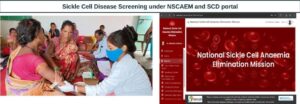 India’s tribal communities, who represent the soul of the nation’s cultural diversity, comprise 8.6% of the population. Despite their rich heritage, these communities have long struggled silently with a debilitating genetic disorder—Sickle Cell Disease (SCD). The disease has severely impacted their health, livelihoods, and overall development, made worse by geographic isolation and limited access to healthcare facilities.
India’s tribal communities, who represent the soul of the nation’s cultural diversity, comprise 8.6% of the population. Despite their rich heritage, these communities have long struggled silently with a debilitating genetic disorder—Sickle Cell Disease (SCD). The disease has severely impacted their health, livelihoods, and overall development, made worse by geographic isolation and limited access to healthcare facilities.
Recognizing this urgent need, the Government of India launched the National Sickle Cell Anaemia Elimination Mission (NSCAEM) in July 2023, under the leadership of the Hon’ble Prime Minister. This ambitious initiative aims not only to eliminate the genetic transmission of SCD by 2047 but also to restore dignity and health to the millions affected.
Sickle Cell Disease alters the shape of red blood cells, reducing their ability to carry oxygen efficiently and leading to severe complications such as fatigue, pain, infections, and even organ damage. The condition is particularly prevalent among tribal populations, who are genetically more vulnerable. According to the Global Burden of Disease Estimates (2021), around 82,500 children are born with SCD in India each year.
The National Health Policy 2017 had already recognized the unique health challenges posed by SCD. Building on this foundation, the Union Budget 2023 officially announced the NSCAEM, with a target to screen 7 crore individuals under the age of 40 by the financial year 2025–26. Implemented under the Ministry of Health and Family Welfare (MoHFW), this is among the world’s largest population-based genetic screening programs.
In just two years, the mission has made significant progress. As of 31st July 2025, over 6.07 crore individuals have been screened across 300+ districts in 17 high-prevalence states. Of those screened, 2.16 lakh individuals were diagnosed with the disease and 16.92 lakh were identified as carriers. Notably, 95% of these cases are concentrated in five states—Odisha, Madhya Pradesh, Gujarat, Chhattisgarh, and Maharashtra.
The success of the mission is reflected in the story of Meena, a tribal girl from Nawapara Ambikapur, Chhattisgarh. She was diagnosed with SCD during the screening and enrolled in her local Sub-Health Centre (SHC). With the support of trained health workers—CHO, ANM, and ASHA—she received free hydroxyurea, a key medication that has improved her quality of life. Meena is now an advocate for genetic counselling in her community.
To boost the pace of screening, Point-of-Care (PoC) diagnostic kits approved by the Indian Council of Medical Research (ICMR) have been widely deployed. Initially limited to just 3, the number of approved kits has now grown to over 30, bringing the cost down significantly from ₹100 to just ₹28 per test—making diagnostics more accessible and affordable.
The NSCAEM mission is not just about detection. It ensures comprehensive care, including free essential medicines and diagnostics, with hydroxyurea now added to the National Essential Drug List (EDL). These services are available at the grassroots level through Sub-Health Centres and Ayushman Arogya Mandirs (SHC-AAM), reaching even the most remote populations.
Another critical component of the mission is genetic counselling and public awareness. Over 2.62 crore Genetic Status Cards have been issued, equipping individuals with vital information to make informed reproductive and healthcare decisions. These cards are key tools in breaking the cycle of genetic transmission.
To further strengthen healthcare infrastructure, 15 medical colleges and health institutions are being developed as Centres of Excellence (CoEs), supported by both MoHFW and the Ministry of Tribal Affairs (MoTA). These centers will focus on prenatal diagnosis, management of severe SCD cases, and provide advanced, specialized care. A National Training of Trainers (ToT) held in October 2024 has also trained healthcare providers in effective SCD management.
The mission is guided by a “Whole-of-Government” approach, involving coordinated efforts from the Ministries of Health, Tribal Affairs, Social Justice, Education, and Women & Child Development. This cross-sector collaboration ensures the mission addresses not just the medical but also the social and cultural dimensions of tribal health. Research-backed strategies, supported by the Department of Health Research, further enhance the mission’s cost-effectiveness and outcomes.
Looking ahead, the Ministry of Health is now focusing on expanding genetic counselling services, intensifying awareness campaigns, and ensuring every diagnosed individual receives timely treatment. Leveraging community-level platforms will be crucial to closing the remaining gaps in care. Enhanced research and data analysis will also help tailor interventions more effectively.
The spirit of the mission is captured in its powerful motto:
“Supporting our fighters, strengthening our survivors, and standing by our warriors.”
By combining strong political will, innovation in science and technology, and grassroots action, India is making remarkable strides toward eliminating Sickle Cell Anaemia by 2047.
In this collective journey, stories like Meena’s remind us that the battle against SCD is not just a public health campaign—it is a commitment to equity, dignity, and social justice for the most marginalized. The National Sickle Cell Anaemia Elimination Mission stands as a beacon of hope, inspiring action and change at every level, and paving the way for a healthier, more inclusive India.



